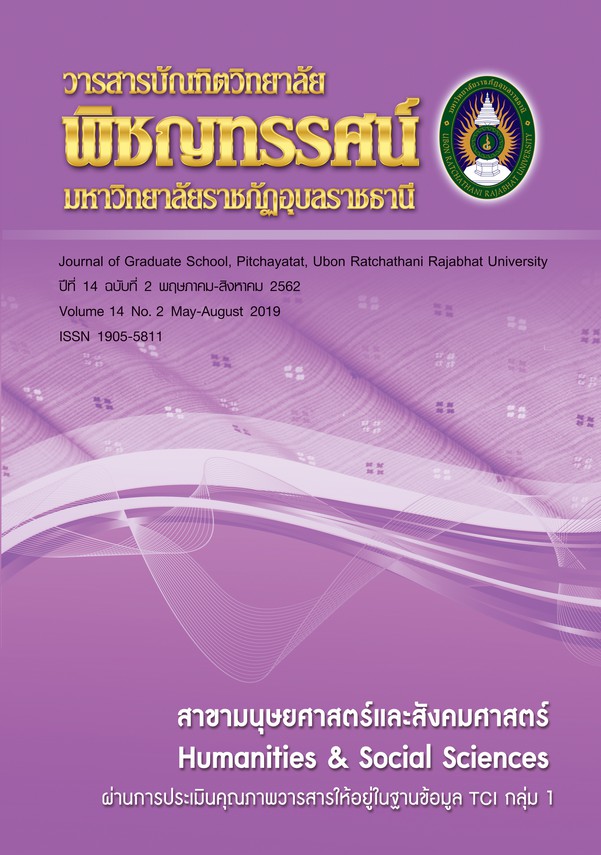ความฉลาดทางจิตวิญญาณกับยุคพลิกผันเทคโนโลยีดิจิทัล
คำสำคัญ:
ความฉลาดทางจิตวิญญาณ, เชาวน์ทางจิตวิญญาณ, เอสคิว, ทฤษฎีดอกบัวแห่งตัวตนบทคัดย่อ
ปัจจุบันเทคโนโลยีดิจิทัลทำให้เกิดนวัตกรรมที่อำนวยความสะดวกต่อมนุษย์ การนำปัญญาประดิษฐ์ซึ่งมีไอคิวสูงมาใช้ ทำให้งานต่าง ๆ มีประสิทธิภาพมากขึ้น ในทางกลับกันก็นำไปสู่ผลกระทบด้านลบ จากวิวัฒนาการที่ก้าวล้ำพลิกผันวิถีมนุษย์ให้เปลี่ยนแปลงทำให้คนเริ่มสนใจความสุขจากภายใน นั่นคือ ความฉลาดทางจิตวิญญาณที่เป็นจุดเริ่มต้นและเป็นพลังชีวิตเกี่ยวข้องกับสุขภาพจิตและสุขภาพกาย เป็นการบูรณาการความฉลาดสมองซีกซ้ายและซีกขวาที่มีประสิทธิภาพต่อการค้นพบตนเอง การมีส่วนร่วมของสังคมสู่ความสุขของมนุษย์อย่างแท้จริง ซึ่งเป็นแนวคิดให้เข้าใจปรากฏการณ์ที่เกิดขึ้น สามารถปรับตัวให้ชีวิตสมดุล โดยบทความนี้ได้นำเสนอเนื้อหาความฉลาดทางจิตวิญญาณ ซึ่งรวบรวมวรรณกรรมที่ศึกษาความสัมพันธ์ความฉลาดทางจิตวิญญาณในบริบทต่าง ๆ ที่เป็นพื้นฐานนำไปสู่การประยุกต์ใช้แนวคิด ทฤษฎี เพื่อการศึกษาวิจัยการพัฒนาความฉลาดทางจิตวิญญาณในยุคพลิกผันเทคโนโลยีดิจิทัล ยังผลให้เกิดประโยชน์และคุณค่ามหาศาลต่อความผาสุกมนุษย์
เอกสารอ้างอิง
ศรัญญารัตน์ คงอิ่ม. โมเดลเชิงสาเหตุของความฉลาดทางจิตวิญญาณของนักเรียนโดยมีความฉลาดทางอารมณ์เป็นตัวแปรส่งผ่าน. กรุงเทพฯ: 2554. จุฬาลงกรณ์มหาวิทยาลัย.
เศรษฐพงศ์ มะลิสุวรรณ. Disruption Part III. (ออนไลน์) 2561 (อ้างเมื่อ 9 เมษายน 2561). จาก https://nbtc.go.th/
Alirastgar, B., et al. A Study of The Relationship between Employees’ Spiritual Intelligence and Job Satisfaction: A Survey in Iran’s Banking Industry. Spectrum: A Journal of Multidisciplinary Research.1, 2 (2012): 57-74.
Alex, M., & Ajawani, J.C. Marital Happinessas The Function of Spiritual Intelligence. International Multidisciplinary Research Journal 2011. 1, 9 (2011): 6-7.
Ameling, A., & Pavilonis, M. Spirituality, Meaning, Mental Health, and Nursing. Journal of Psycho-Social Nursing and Mental Health Services. 39,4 (2001): 16-20.
Amram, Y. The Seven Dimensions of Spiritual Intelligence: An Ecumenical, Grounded Theory. Presented at the 115th Annual Conference of the American Psychological Association San Francisco; 17-20 August 2007; CA.
Amram, Y., & Dryer, C. The Integrated Spiritual Intelligence Scale (ISIS): Development and Preliminary Validation. Paper Presented at the 116th Annual Conference of The American Psychological Association Boston; 14-17 August 2008; MA.
Cheryl, F. Facilitating Spiritual Intelligence in South African Secondary School Learners. KOERS-Bulletin for Christian Scholarship. 80, 2 (2015): 1-8.
Cindy. Spiritual Intelligence. Deep Change Author, SQ21: The Twenty-One Skills of Spiritual Intelligence. (Online) 2012 (Cited May 14, 1018). Available from: www.SQ21book.com
Didik, S. Improving the Students’ Spiritual Intelligence in English Writing Through Whole Brain Learning. English Language Teaching. 9, 4 (2016): 230-238.
Doostar, M., et al. Survey of Relationship between Spiritual Intelligence and Organizational Citizenship Behavior. Interdisciplinary Journal of Contemporary Research in Business. 3, 11 (2012): 54-61.
Ghobari, B.B., et al. Spiritual Intelligence. Innovate Religious Ideas. 3, 10 (2007): 125-147.
Green, W.N., and Noble, K.D. Fostering Spiritual Intelligence: Undergraduates’ Growth in a Course About Consciousness. Advanced Development Journal. 12 (2010): 26-48.
Griffiths, R. The Definition of Spiritual Intelligence. (Online) 2017 (Cited April 9, 2017). Available from: https://sqi.co/definition-of-spiritual-intelligence/
Hanafi, R. Spiritual Intelligence, Emotional Intelligence and Auditor’s Performance. JAAI VOLUME. 14, 1 2010): 29–40.
Jain, M., and Purohit, P. Spiritual Intelligence: A Contemporary Concern with Regard to Living Status of the Senior Citizens. Journal of the Indian Academy of Applied Psychology. 32, 3 (2006): 227-233.
Jeloudar, S.Y., et al. Exploring the Relationship between Teachers’ Spiritual Intelligence and Classroom Discipline Strategies. International Journal of Psychological Studies. 3, 2 (2011): 131-148.
King, D.B., and DeCicco, T.L. A Viable Model and Self-Report Measure of Spiritual Intelligence. International Journal of Transpersonal Studies. 28, 1 (2009): 68-85.
Kumar, T., and Pragadeeswaran, S. Effects of Occupational Stress on Spiritual Quotient Among Executives. International Journal of Trade, Economics and Finance. 2, 4 (2011): 288-292.
Moosa, J., and Ali, N.M. The Study Relationship between Parenting Styles and Spiritual Intelligence. Journal of Life Science and Biomedicine. 1, 1 (2011): 24-27.
Neal, J., and Harpham, A. (2018). The Spirit of Project Management. (Online) 2018 (Cited August 5, 2018.) Available from: https://www.gpmfirst.com/books/
Selman, V., et al. Spiritual-Intelligence/-Quotient. College Teaching Methods & Styles Journal-Third Quarter. 1, 3 (2005): 23-30.
Vaughan, F. What is Spiritual Intelligence. Journal of Humanistic Psychology. 42, 2 (2002): 16-33.
Wigglesworth, C. Hierarchy of Human Intelligences. (Online) 2006 (Cited May 8, 2018). Available from: https://www.gpmfirst.com/
Zohar, D., and Marshall, I. Spiritual Intelligence the Ultimate Intelligence. 1st ed. New York: Bloomsbury, 2001.
Zohar, D., and Marshall, I. Spiritual Capital: Wealth We Can Live. 1st ed. New York: Bloomsbury, 2004.
ดาวน์โหลด
เผยแพร่แล้ว
รูปแบบการอ้างอิง
ฉบับ
ประเภทบทความ
สัญญาอนุญาต
บทความทุกเรื่องได้รับการตรวจความถูกต้องทางวิชาการโดยผู้ทรงคุณวุฒิภายนอกอย่างน้อย 3 คน ความคิดเห็นในวารสารพิชญทรรศน์เป็นความคิดเห็นของผู้นิพนธ์มิใช่ความคิดเห็นของผู้จัดทำ จึงมิใช่ความรับผิดชอบของวารสารพิชญทรรศน์ และบทความในวารสารพิชญทรรศน์สงวนสิทธิ์ตามกฎหมายไทย การจะนำไปเผยแพร่ต้องได้รับอนุญาตเป็นลายลักษณ์อักษรจากกองบรรณาธิการ





